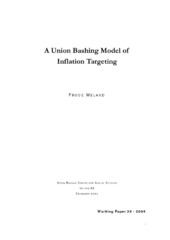| dc.contributor.author | Meland, Frode | eng |
| dc.date.accessioned | 2006-06-21T12:24:27Z | |
| dc.date.accessioned | 2020-12-10T06:31:39Z | |
| dc.date.available | 2006-06-21T12:24:27Z | |
| dc.date.available | 2020-12-10T06:31:39Z | |
| dc.date.issued | 2004-12 | eng |
| dc.identifier.issn | 1503-0946 | |
| dc.identifier.uri | https://hdl.handle.net/1956/1346 | |
| dc.description.abstract | This paper shows that in an open economy, general price level inflation targeting may provide large wage setters with little incentive for wage restraint. This contradicts recent developments within the inflation targeting literature, and the discrepency is due to the asymmetric impact exchange rate changes have on sectors shielded from, and sectors open to, international trade. By disciplining unions in the non-shielded sectors, exchange rate targeting yields higher employment than inflation targeting when unions in the open sector are strong relative to their shielded sector counterparts. In the opposite case, when unions are stronger in the shielded sector, we show that general price level inflation targeting is inferior to an inflation target that focuses only on shielded sector prices. | en_US |
| dc.format.extent | 835273 bytes | eng |
| dc.format.mimetype | application/pdf | eng |
| dc.language.iso | eng | eng |
| dc.publisher | Stein Rokkan Centre for Social Studies | eng |
| dc.relation.ispartofseries | 28-2004 | |
| dc.relation.ispartofseries | Working Paper | en |
| dc.title | A Union Bashing Model of Inflation Targeting | eng |
| dc.type | Working paper | eng |
| dc.subject.nsi | VDP::Samfunnsvitenskap: 200 | nob |
